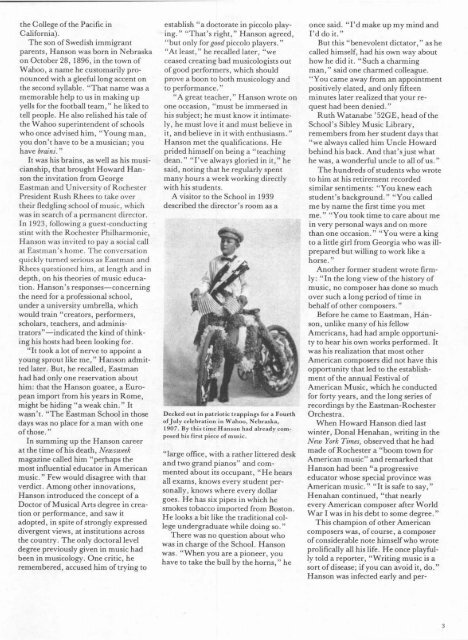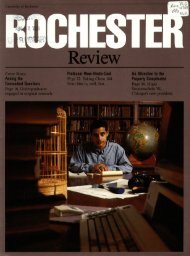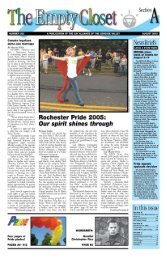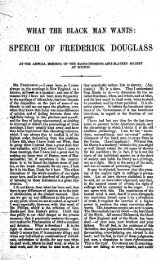Here - University of Rochester Libraries
Here - University of Rochester Libraries
Here - University of Rochester Libraries
Create successful ePaper yourself
Turn your PDF publications into a flip-book with our unique Google optimized e-Paper software.
the College <strong>of</strong>the Pacific in<br />
California).<br />
The son <strong>of</strong> Swedish immigrant<br />
parents, Hanson was born in Nebraska<br />
on October 28, 1896, in the town <strong>of</strong><br />
Wahoo, a name he customarily pronounced<br />
with a gleeful long accent on<br />
the second syllable. "That name was a<br />
memorable help to us in making up<br />
yells for the football team," he liked to<br />
tell people. He also relished his tale <strong>of</strong><br />
the Wahoo superintendent <strong>of</strong>schools<br />
who once advised him, "Young man,<br />
you don't have to be a musician; you<br />
have brains. "<br />
It was his brains, as well as his musicianship,<br />
that brought Howard Hanson<br />
the invitation from George<br />
Eastman and <strong>University</strong> <strong>of</strong><strong>Rochester</strong><br />
President Rush Rhees to take over<br />
their fledgling school <strong>of</strong> music, which<br />
was in search <strong>of</strong> a permanent director.<br />
In 1923, following a guest-conducting<br />
stint with the <strong>Rochester</strong> Philharmonic,<br />
Hanson was invited to pay a social call<br />
at Eastman's home. The conversation<br />
quickly turned serious as Eastman and<br />
Rhees questioned him, at length and in<br />
depth, on his theories <strong>of</strong> music education.<br />
Hanson's responses-concerning<br />
the need for a pr<strong>of</strong>essional school,<br />
under a university umbrella, which<br />
would train "creators, performers,<br />
scholars, teachers, and administrators"-indicated<br />
the kind <strong>of</strong> thinking<br />
his hosts had been looking for.<br />
"It took a lot <strong>of</strong> nerve to appoint a<br />
young sprout like me, " Hanson admitted<br />
later. But, he recalled, Eastman<br />
had had only one reservation about<br />
him: that the Hanson goatee, a European<br />
import from his years in Rome,<br />
might be hiding "a weak chin." It<br />
wasn't. "The Eastman School in those<br />
days was no place for a man with one<br />
<strong>of</strong>those. "<br />
In summing up the Hanson career<br />
at the time <strong>of</strong>his death, Newsweek<br />
magazine called him "perhaps the<br />
most influential educator in American<br />
music. " Few would disagree with that<br />
verdict. Among other innovations,<br />
Hanson introduced the concept <strong>of</strong> a<br />
Doctor <strong>of</strong>Musical Arts degree in creation<br />
or performance, and saw it<br />
adopted, in spite <strong>of</strong>strongly expressed<br />
divergent views, at institutions across<br />
the country. The only doctoral level<br />
degree previously given in music had<br />
been in musicology. One critic, he<br />
remembered, accused him <strong>of</strong>trying to<br />
establish"a doctorate in piccolo playing."<br />
"That's right," Hanson agreed,<br />
"but only for good piccolo players. "<br />
"At least," he recalled later, "we<br />
ceased creating bad musicologists out<br />
<strong>of</strong> good performers, which should<br />
prove a boon to both musicology and<br />
to performance."<br />
"A great teacher, " Hanson wrote on<br />
one occasion, "must be immersed in<br />
his subject; he must know it intimately,<br />
he must love it and must believe in<br />
it, and believe in it with enthusiasm."<br />
Hanson met the qualifications. He<br />
prided himselfon being a "teaching<br />
dean." "I've always gloried in it," he<br />
said, noting that he regularly spent<br />
many hours a week working directly<br />
with his students.<br />
A visitor to the School in 1939<br />
described the director's room as a<br />
Decked out in patriotic trappings for a Fourth<br />
<strong>of</strong>July celebration in Wahoo, Nebraska,<br />
1907. By this time Hanson had already composed<br />
his first piece <strong>of</strong> music.<br />
"large <strong>of</strong>fice, with a rather littered desk<br />
and two grand pianos" and commented<br />
about its occupant, "He hears<br />
all exams, knows every student personally,<br />
knows where every dollar<br />
goes. He has six pipes in which he<br />
smokes tobacco imported from Boston.<br />
He looks a bit like the traditional college<br />
undergraduate while doing so."<br />
There was no question about who<br />
was in charge <strong>of</strong>the School. Hanson<br />
was. "When you are a pioneer, you<br />
have to take the bull by the horns," he<br />
once said. "I'd make up my mind and<br />
I'd do it."<br />
But this "benevolent dictator," as he<br />
called himself, had his own way about<br />
how he did it. "Such a charming<br />
man," said one charmed colleague.<br />
"You came away from an appointment<br />
positively elated, and only fifteen<br />
minutes later realized that your request<br />
had been denied."<br />
Ruth Watanabe '52GE, head <strong>of</strong>the<br />
School's Sibley Music Library,<br />
remembers from her student days that<br />
"we always called him Uncle Howard<br />
behind his back. And that'sjust what<br />
he was, a wonderful uncle to all <strong>of</strong>us. "<br />
The hundreds <strong>of</strong>students who wrote<br />
to him at his retirement recorded<br />
similar sentiments: "You knew each<br />
student's background." "You called<br />
me by name the first time you met<br />
me. " "You took time to care about me<br />
in very personal ways and on more<br />
than one occasion." "You were a king<br />
to a little girl from Georgia who was illprepared<br />
but willing to work like a<br />
horse. "<br />
Another former student wrote firmly:<br />
"In the long view <strong>of</strong> the history <strong>of</strong><br />
music, no composer has done so much<br />
over such a long period <strong>of</strong>time in<br />
behalf<strong>of</strong>other composers."<br />
Before he came to Eastman, Hanson,<br />
unlike many <strong>of</strong> his fellow<br />
Americans, had had ample opportunity<br />
to hear his own works performed. It<br />
was his realization that most other<br />
American composers did not have this<br />
opportunity that led to the establishment<br />
<strong>of</strong>the annual Festival <strong>of</strong><br />
American Music, which he conducted<br />
for forty years, and the long series <strong>of</strong><br />
recordings by the Eastman-<strong>Rochester</strong><br />
Orchestra.<br />
When Howard Hanson died last<br />
winter, Donal Henahan, writing in the<br />
New York Times, observed that he had<br />
made <strong>of</strong><strong>Rochester</strong> a "boom town for<br />
American music" and remarked that<br />
Hanson had been "a progressive<br />
educator whose special province was<br />
American music." "It is safe to say,"<br />
Henahan continued, "that nearly<br />
every American composer after World<br />
War I was in his debt to some degree. "<br />
This champion <strong>of</strong>other American<br />
composers was, <strong>of</strong>course, a composer<br />
<strong>of</strong>considerable note himselfwho wrote<br />
prolifically all his life. He once playfully<br />
told a reporter, "Writing music is a<br />
sort <strong>of</strong>disease; ifyou can avoid it, do."<br />
Hanson was infected early and per-<br />
3
















